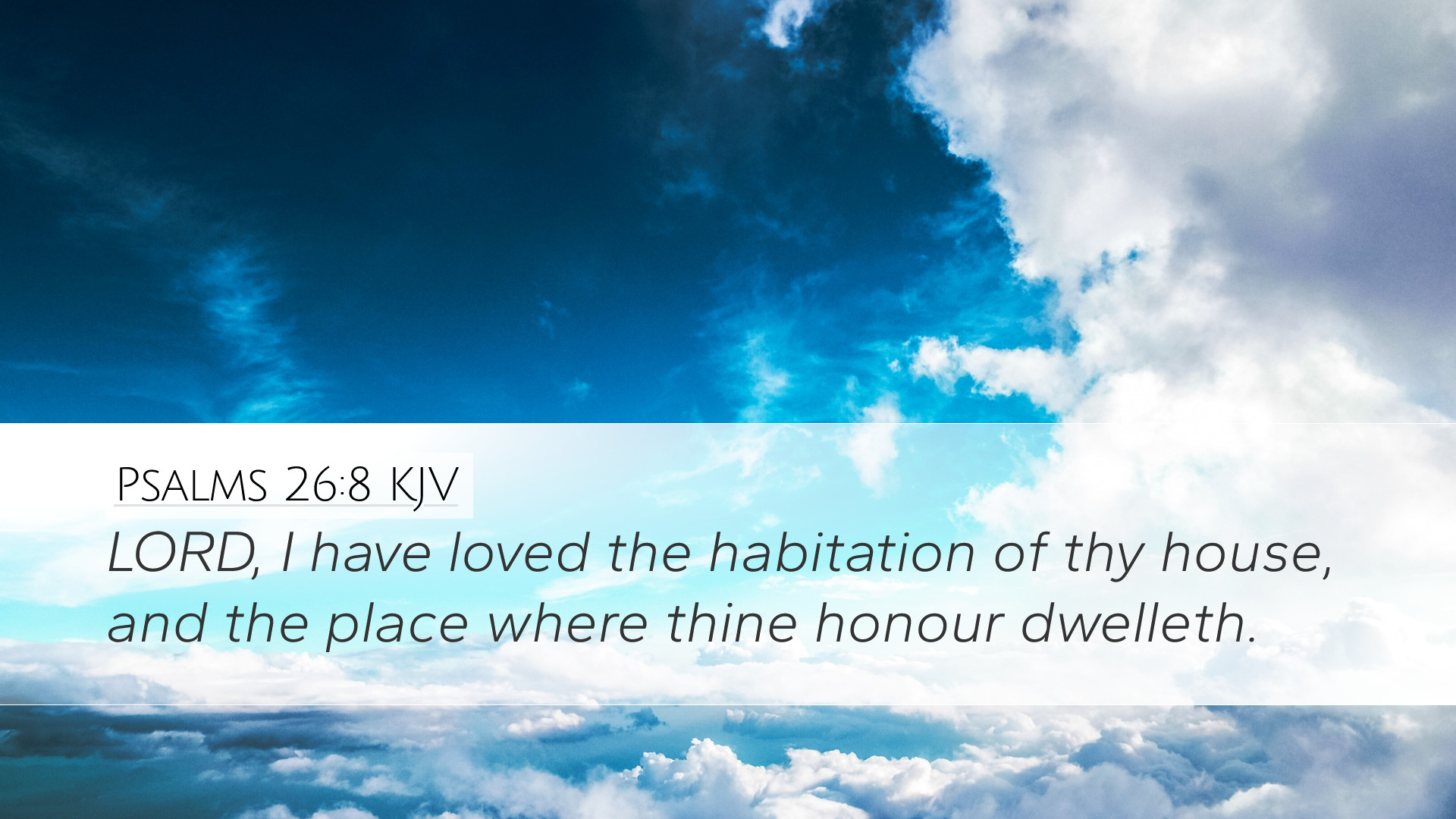Psalms 26:8 - A Comprehensive Commentary
Bible Verse: "O Lord, I love the habitation of thy house, and the place where thy honour dwelleth." (Psalms 26:8)
Introduction
The verse in question, Psalms 26:8, delivers a profound expression of the psalmist's affection for the assembly of God and the sacred space where His glory is manifested. This commentary will explore insights from various public domain sources, providing depth and understanding for pastors, students, theologians, and Bible scholars.
Historical Context
The Book of Psalms is a collection of poetic texts that express the heart's devotional responses towards God. Written primarily by David, this particular psalm appears to reflect a time of introspection where the psalmist is affirming his integrity and love for God's dwelling place.
Matthew Henry's Commentary
Importance of God's House: Henry emphasizes the significance of the "habitation" of God. He suggests that the psalmist's love for God's house illustrates a deep desire for communion with the Divine, highlighting how the sanctuary is a place for worship, prayer, and gathering.
Personal Application: According to Henry, the psalmist's declaration serves as a model for believers to express their affection towards the church and the assembly of saints. It is a reminder that the heart's inclination towards worship is crucial for spiritual growth.
Albert Barnes' Notes
Divine Presence: Barnes notes that the "place where thy honour dwelleth" signifies the location of God's presence among His people. He interprets this as a reference not only to the physical temple but also to the spiritual environment where God's attributes can be revered and honored.
Unity with God: Barnes encourages the understanding that a deep admiration for God's habitation reflects a believer's desire to dwell in unity with God. He stresses the necessity of cherishing fellowship with God and being part of a community that glorifies Him.
Adam Clarke's Commentary
Love for the Sanctuary: Clarke points out that the psalmist’s expression of love is not merely emotional but also active. He encourages engagement in the worship of God, indicating that true love for God's house results in commitment to His service and congregation.
Theological Insight: Clarke provides a theological perspective by discussing the implications of loving God's house. He explains that the devotion expressed here is indicative of a greater relationship with God, as one cannot love God without also cherishing His ordinances and environments of worship.
Thematic Analysis
- Love for God's Presence: The central theme revolves around the love for God’s dwelling, emphasizing that true delight comes from experiencing God’s presence in worship.
- The Role of the Community: The verse highlights how the collective gathered for worship embodies God's honour and glory, suggesting the importance of community in spiritual life.
- Spiritual Integrity: The psalmist’s declaration is tied to his reliance on and commitment to living authentically according to God’s will, presenting integrity as foundational to approaching God's presence.
Applications for Believers
The reflections offered by Henry, Barnes, and Clarke provide several actionable insights for contemporary believers:
- Cultivating Love for Worship: Encourage both personal and communal worship, developing a heart that genuinely loves the sacred spaces and gatherings dedicated to God.
- Seeking God’s Presence: Engage deeply in prayer and the sacraments, recognizing that true honor to God’s presence is what brings spiritual edification.
- Participation in Community: Actively participate in the church body, fostering relationships that build up the community and honor God collectively.
- Personal Integrity: Strive for a life of integrity that aligns with the values of holiness and righteousness, recognizing it as essential to approaching God's habitation.
Conclusion
Psalms 26:8 serves as a timeless reminder of the significance of God's habitation and the love that believers ought to cultivate towards it. The insights gleaned from Matthew Henry, Albert Barnes, and Adam Clarke foster a deeper understanding of the implications of this verse, urging an authentic relationship with God that blossoms in the context of His house. Pastors, students, theologians, and Bible scholars are encouraged to reflect on their personal engagement with worship, community, and integrity as they aspire to honor God in all realms of their lives.


